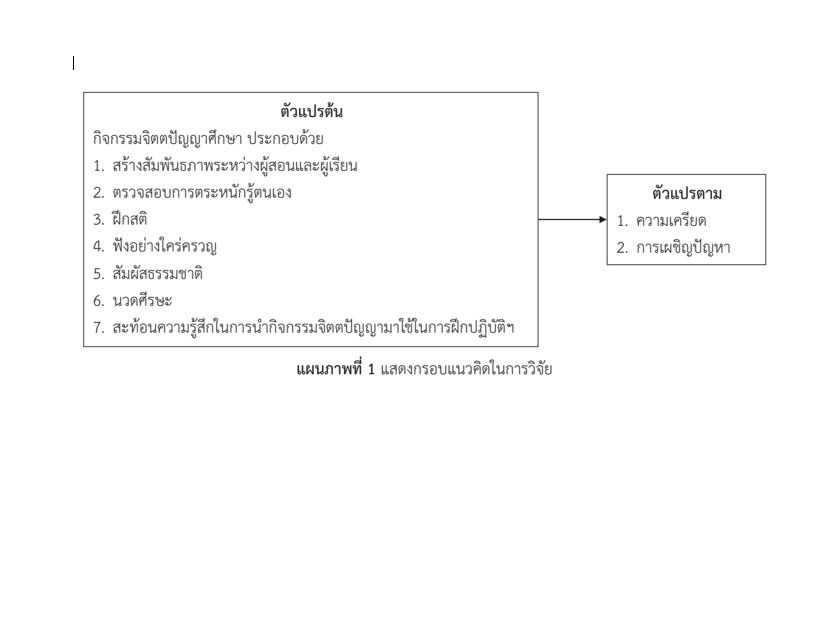ผลการใช้กิจกรรมจิตตปัญญาศึกษาเพื่อลดความเครียด และส่งเสริมการเผชิญปัญหาของนักศึกษาพยาบาล ในวิชาปฏิบัติหลักการและเทคนิคการพยาบาล
คำสำคัญ:
กิจกรรมจิตตปัญญาศึกษา, ความเครียดของมารดา, การเผชิญปัญหา, นักศึกษาพยาบาลบทคัดย่อ
การศึกษาครั้งนี้เป็นการวิจัยกึ่งทดลองแบบสองกลุ่มวัดก่อนและหลังการทดลอง มีวัตถุประสงค์เพื่อศึกษาผลการใช้กิจกรรมจิตตปัญญาศึกษาเพื่อลดความเครียดและส่งเสริมการเผชิญปัญหาของนักศึกษาพยาบาล ในวิชาปฏิบัติหลักการและเทคนิคการพยาบาล กลุ่มตัวอย่างเป็นนักศึกษาพยาบาลชั้นปีที่ 2 สถาบันการศึกษาแห่งหนึ่ง จำนวน 34 คน คัดเลือกตามเกณฑ์คัดเข้าและการสุ่มอย่างง่าย แบ่งเป็น 2 กลุ่มควบคุมได้รับการสอนตามปกติจำนวน 17 คน และกลุ่มทดลองได้รับกิจกรรมจิตตปัญญาศึกษาจำนวน 17 คน เก็บรวบรวมข้อมูลโดยใช้แบบประเมินความเครียดของกรมสุขภาพจิต มีค่าความเที่ยงเท่ากับ .87 และแบบประเมินการเผชิญปัญหาในการฝึกปฏิบัติการพยาบาลซึ่งพัฒนาโดยผู้วิจัย ตรวจสอบความตรงเชิงเนื้อหาของแบบประเมิน มีค่า 0.67-1.00 และมีค่าความเที่ยงเท่ากับ .77 ตามลำดับ วิเคราะห์ข้อมูลโดยใช้สถิติเชิงพรรณนา สถิติไคว์สแคว์ (Chi-square) และสถิติทีอิสระจากกัน (Independent t test)
ผลการวิจัย พบว่า ภายหลังการทดลอง กลุ่มทดลองมีคะแนนค่าเฉลี่ยความเครียด (Mean = 42.35 ±10.16) น้อยกว่ากลุ่มควบคุม (Mean = 48.94 ± 6.39) อย่างมีนัยสำคัญทางสถิติที่ระดับ 0.05 (p=.03) และมีคะแนนค่าเฉลี่ยการเผชิญปัญหาในการฝึกปฏิบัติการพยาบาล (Mean = 67.82 ±5.16) มากกว่ากลุ่มควบคุม (Mean = 48.64± 6.37) อย่างมีนัยสำคัญทางสถิติที่ระดับ .05 (p < .001) แสดงให้เห็นว่ากิจกรรมจิตตปัญญาสามารถลดความเครียดและส่งเสริมการเผชิญปัญหาในการฝึกปฏิบัติการพยาบาลของนักศึกษาพยาบาลได้ ดังนั้นอาจารย์ควรนำกิจกรรมจิตตปัญญาไปใช้เพื่อให้นักศึกษาผ่อนคลายความเครียดและส่งเสริมทักษะการเผชิญปัญหาในการเรียนการสอนภาคปฏิบัติ
เอกสารอ้างอิง
Academic Department, Boromarajonani College of Nursing, Buddhachinaraj. (2023). Data on counseling for nursing students, Boromarajonani College of Nursing, Buddhachinaraj. (Copied document) [In Thai].
Aloufi, M. A., Jarsen, R. J., Gerdtz, M. F., & Kapp, S. (2021). Reducing stress, anxiety and depression in undergraduate nursing students: Systematic review. Nurse Education Today 102, 104877. doi: 10.1016/j.nedt.2021.104877.
Chaiwcharn, T., & Papol, A. (2020). The stress of nursing student training. EAU Heritage Journal Science and Technology,15(1), 21-28. [In Thai].
Chirawatkul, A. (2013). Designing questionnaire for research. Bangkok: Withayapat.
Choosang, S., & Nilapun, M. (2020). The paradign of contemplative education enhance humanized care of nursing student, Silpakorn Educational Research Journal, 13(1), 9-23. [In Thai].
Contemplative Education Center, Mahidol University. (2014). Contemplative education. Retrieved 12 March 2023 from http://www.ce.mahidol.ac.th/eng/
Faul, F., Erdfelder, E., Lang, A. G., Buchner, A. (2007). G*Power 3: A flexible statistical power analysis program for the social, behavioral, and biomedical sciences. Behavior Research Methods, 39(2), 175-91. doi: 10.3758/bf03193146.
George, D., & Mallery, M. (2010). SPSS for Windows step by step: A simple guide and reference, 17.0 update (10th ed.) Boston: Pearson.
Heinrich, D. S., & O’ Connell, K. A. (2024) The effects of mindfeulness meditation on nursing students’ stress and anxiety level. Nursing Education Perspective, 45(1), 31-36. doi: 10.1097/01.NEP.0000000000001159
Hwang, E., Kim, M., & Shin. S. (2021). Initial clinical practicum stress among nursing students: A cross-sectional study on coping style. International Journal of Environmental Research and Public Health, 18(9), 4932.
Jamjeng, S., Austhamethakul, W., & Pituksin, D. (2018). The effect of readiness preparation for nursing practice in ward of 2nd year nursing students, Borommarajonnani College of Nursing, Ratchaburi. Journal of Science and Technology, Ubon Ratchathani
University, 20(3), 147-163. [In Thai].
Kamdaeng, P. (2021). Supervision in clinical practice regarding expectations of nursing students. Journal of Nurses Association of Thailand Northern Region, 27(1), 17-28. [In Thai].
Lai, M. H., Tzeng, C. Y., Jen, H. J., & Chung, M.H. (2022). The Influence of reducing clinical practicum anxiety on nursing professional employment in nursing students with low emotional stability. International Journal Environmental Research Public
Health, 19(14), 8374. doi: 10.3390/ijerph19148374.
Latif, R. A., & Nor, M. Z. M. (2019). Stressors and coping strategies during clinical practice among diploma nursing students. Malaysian Journal of Medical Sciences, 26(2), 88-98. doi: 10.21315/mjms2019.26.2.10.
Lavoie-Tremblay, M, Sanzone, L., Aubé, T., & Paquet, M. (2022). Sources of stress and coping strategies among undergraduate nursing students across all years. Canadian Journal of Nursing Research, 54(3), 261-271. doi: 10.1177/08445621211028076
Mahatnirunkul, S., Poompisanchai, V., & Tapunya, P. (1997). Suanprung stress test-20. Academic Psychiatry and Psychology Journal, 13(3), 1-20. [in Thai]
Mahesneh, D., Shoqirat, N., Alsaraireh, A., Sigh, C., & Thorpe, L. (2021). From learning on Mannequins to practice on patients: Nursing students’ first-time experience of clinical placement in Jordan. SAGE Open Nursing, 7, 1-7. doi:10.1177/23779608211004298.
Meena, B. M., Manasa, B., Vijayakumar, V., Kiran, Salagame, K. K., & Jois, S. N. (2021). Nursing student's experiences of meditation on twin hearts during eight weeks practice: A qualitative content analysis. SAGE Open Nursing, 7, 1-10.
https://doi.org/10.1177/23779608211052118
Simmer-Brown, J. (2019). Contemplative teaching and learning: Opportunities for Asian
studies. ASIA Network Exchange, 26(1), 5-25. doi: http://doi.org/10.16995/ane.291
Sornlob, P., Sroisong, S., Fuongtong, P., & Teerapong, N. (2022). Effects of contemplative education on happiness learning and holistic nursing among nursing students. Journal of Health Science Boromarajonani College of Nursing Sunpasitthiprasong, 6(1), 112-126. [In Thai].
Sroisong, S., Fuongtong, P., Somlob, P., Ngaoratsamee, J., & Teerapong, N. (2023). The effects of using a teaching model with contemplative education in practicum to enhance resilience among nursing students in the first-time of nursing practice. Journal of Nursing and Health Science, 17(1), 182-197. [In Thai].
Tantalanukul, S., & Wongsawat, P. (2017). Stress and stress management in nursing students. Boromarajonani College of Nursing Uttaradit Journal, 9(1), 81-92. [In Thai].
Torné-Ruiz, A., Reguant, M., & Roca, J. (2023). Mindfulness for stress and anxiety management in nursing students in a clinical simulation: A quasi-experimental study. Nurse Education in Practice, 66, 103533. doi: 10.1016/j.nepr.2022.103533.
Triamchaisri, S. K. (2018). Meditation Technique SKT 8: New technique for intensive patients. Retrieved for https://www.youtube.com/watch?v=JPwY4-ZXoVs [In Thai].
van Dyk, E. C., van Rensburg, G. H., & van Rensburg, E. S. J. (2021). A model to foster and facilitate trust and trusting relationships in the nursing education context. Health SA Gesondheid, 26, 1-10.
Vliet, M. V., Jong, M. C., & Jong, M. (2018). A mind-body skills course among nursing and medical students: A pathway for an improved perception of self and the surrounding world. Global Qualitative Nursing Research, 5, 1-13.

ดาวน์โหลด
เผยแพร่แล้ว
รูปแบบการอ้างอิง
ฉบับ
ประเภทบทความ
สัญญาอนุญาต

อนุญาตภายใต้เงื่อนไข Creative Commons Attribution-NonCommercial-NoDerivatives 4.0 International License.




